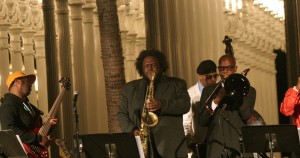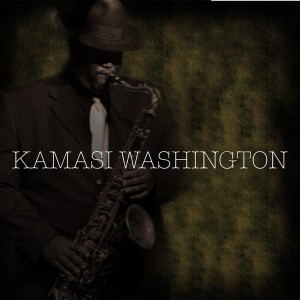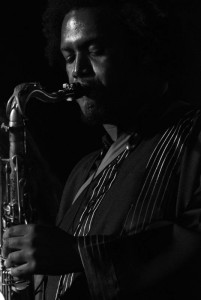KAMASI WASHINGTON: YOUNG JAZZ GIANT
By Eveline Morel | October 8th, 2012 | Category: Indie Hotspot, Jazz, Music | Comments Off on KAMASI WASHINGTON: YOUNG JAZZ GIANT Kamasi Washington was born in Los Angeles at the start of the 80s into a family where music was akin to breathing. His mother, an accomplished flutist, taught chemistry in high school, and his father, who plays with him in some concerts, was a professional saxophonist by night and high school music teacher by day. By two years old, Kamasi had already started playing the drums and the piano, and by seven he started playing the clarinet. He started playing the tenor saxophone at twelve, the saxophone that his father passed down to him.
Kamasi Washington was born in Los Angeles at the start of the 80s into a family where music was akin to breathing. His mother, an accomplished flutist, taught chemistry in high school, and his father, who plays with him in some concerts, was a professional saxophonist by night and high school music teacher by day. By two years old, Kamasi had already started playing the drums and the piano, and by seven he started playing the clarinet. He started playing the tenor saxophone at twelve, the saxophone that his father passed down to him.
Kamasi attended the Hamilton High School Music Academy and joined the Multi-school Jazz Band, an assembly of the finest young jazz musicians in LA County, led by Reginald Andrews. In his senior year in high school, he competed in the John Coltrane Saxophone Competition, where he received the first place award which led to a record deal.
Not unexpectedly, Kamasi’s biggest influence, besides his parents, talented musicians, and educators, was John Coltrane. “John Coltrane was my biggest influence. I have a lot of big influences in music, literally thousands of them. John Coltrane . . . he’s been there the whole time. I go here . . . go there . . . then I go back. He’s like a bright light. When I first heard him, he was too bright for me, but then, once you can see it, it’s so beautiful; it’s really kind of overwhelming.”
 Out of high school, he formed a group which called themselves The Young Jazz Giants. After releasing a much delayed first record–which contained some of his arrangements and compositions—the group disbanded.
Out of high school, he formed a group which called themselves The Young Jazz Giants. After releasing a much delayed first record–which contained some of his arrangements and compositions—the group disbanded.
“I learned a lot from that,” he says. “I was just out of high school. It was a band that we put together. We did the John Coltrane Festival; then the guy heard us on the world stage and said he wanted to record us. It kind of helped me realize that as a musician–especially a professional musician—you can get caught up just playing for people and making other people’s music for them. And it kind of really shed the light on my musical value, where I needed to put the energy and myself as well. There are so many times with musicians that people don’t necessarily know their music because they put their own energy into other people’s music. So it really opened that door for me, to really go out and push what I’m doing.” So after exploring other genres, including hip-hop, and playing with legendary musicians, including Snoop Dog, Raphael Saadiq, and others, Kamasi returned to the jazz fold and started composing his own music.
He formed a new band, “The Next Step,” which explores a different sound, playing mostly his own arrangements and compositions. His father is often a proud member of the band, and they’re recording their next album, slated for release the end of 2012.
One of the first things I noticed about “The Next Step” is the relative youth of the band members (many of them seemed to be around their early 30s) and a new energy about them, a combination of strong respect for their jazz roots and commitment to musical excellence, but also a desire to try new things.
 Kamasi sees a resurgence of jazz with the young generation, partly helped by the Internet. “It’s ironic that with the influx of downloading and people getting music from the Internet, it’s created a curiosity in people to search out music. That’s probably been one of the biggest downfalls of jazz, that you kind of have to search for it; but now, that’s the trend. People like searching for music whereas before, they were expecting the music to find them. Now they go out and search for it. Yes, I found a good resurgence of jazz, especially in young people. They’re more interested I finding quality instead of just the next big name.”
Kamasi sees a resurgence of jazz with the young generation, partly helped by the Internet. “It’s ironic that with the influx of downloading and people getting music from the Internet, it’s created a curiosity in people to search out music. That’s probably been one of the biggest downfalls of jazz, that you kind of have to search for it; but now, that’s the trend. People like searching for music whereas before, they were expecting the music to find them. Now they go out and search for it. Yes, I found a good resurgence of jazz, especially in young people. They’re more interested I finding quality instead of just the next big name.”
He partly attributed this resurgence of jazz in young people to a return to our cultural roots “where music means something. Music is one of the real fundamental human attributes.”
No longer a youngster out of high school, but now a much wiser and a more confident musician, Kamasi is no stranger to the difficulties of making it as a young jazz player. His message to young musicians: “Keep your minds open; don’t lose hope. I know it’s harder for you than it was for me at a younger age just to feel like you’re valid because a lot of times, as a young musician, especially a young jazz musician, you can feel like what you’re doing is not valid, and they only care about people from the past – if you weren’t born in the 20s, then you’re not valid. And that’s not true. Your music is valid; you are valid. Keep making music, keep creating; keep pushing; and I’ll see you on the other side.”
————-
Link to video of recent performance at Jazz at LACMA:

Video by Leroy Hamilton.








